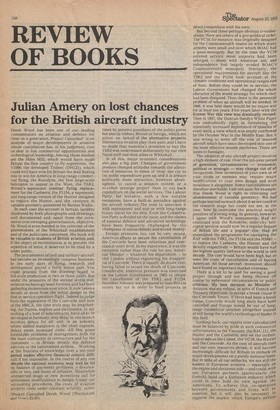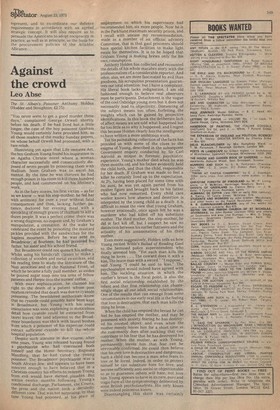Julian Amery on lost chances for the British aircraft industry
Derek Wood has been one of our leading commentators on aviation and defence for close on a generation. Project Cancelled* is an analysis of major developments in aviation whose cancellation has, in his judgment, cost us dear in lost commercial opportunities and technological leadership. Among those studied are the Miles M52, which would have made Britain the first country to fly supersonic, the V1000, the developed Trident (DH121), which could well have won for Britain the lead Boeing was to win for America in long-range commercial flying, the Rotodyne, the first large-scale helicopter to appear in the West, the TSR2, Britain's supersonic contour flying replacement for the Canberra, the P1154, a supersonic and long-range version of the Harrier designed to replace the Hunter, and the ventures in variable geometry pioneered by Barnes Wallis.
in each case the account is factual, lavishly illustrated by both photographs and drawings, well documented and, apart from the occasional over-sweeping generalisation, objective. Mr Wood is even-handed in his criticism of the planemakers, of the Whitehall establishment and of the politicians concerned, His book will be valuable to students of British aviation and, if the object of recrimination is to prevent the repetition of error, it deserves to be read by a wider public.
The procurement of civil and military aircraft has become an increasingly complex business. In the early days of flying, research and development played a fairly minor part. You could proceed from the drawing board to full-scale production in two or three years. But under the pressures of the second world war, aviation technology leapt forward and has been gathering mornentum ever'since. It now takes a decade or more from the initial design to the first in-service operation flight. Indeed to judge from the experience, of the Concorde and now of the MRCA, the time scale may be lengthening. Air frames, engines and electronics, to say nothing of a host of subcontracts, have all to be developed in harmony. Any delay in one branch involves delays for all; and, in an industry where skilled manpower is the chief expense, delays mean increased costs. All this poses formidable problems of management both for the main contractor or contractors and for the customers — in Britain mostly the defence services or the nationalised airlines. Working at the frontiers of knowledge over a ten-year period makes effective financial control difficult if not impossible. In the course of any one decade the national economy may well be hit by balance of payments problems, a devaluation or two, and bouts of inflation. Meanwhile unexpected snags or new inventions call for unforeseen modifications in design. Under our accounting procedures, the costs of aviation projects come under constant scrutiny, some
'Project Cancelled Derek Wood (Macdonald and lane's £5.95)
times by genuine guardians of the public purse but also by lobbies, British or foreign, which are active on behalf of the alternative projects. Interservice rivalries play their part; and 1 have no doubt that Australia's intention to buy the TSR2 was undermined deliberately by our on Naval staff and their allies in Whitehall.
In all this, major economic considerations also play a big part. Changes of government produce changed attitudes towards the allocation of resources. In times of 'stop' the cry to cut public expenditure goes up and it is always politically more attractive, however shortsighted, to cancel a weapon system or a so-called 'prestige project' than to cut back expenditure on the social services. The Labour Party, for instance, with a few notable exceptions, have a built-in prejudice against the aircraft industry.The tend to associate it with rearmament and war or with long-range luxury travel for the elite. Even the Conservative Party is divided on the issue; and the claims of national defence and advanced technology have been frequently challenged by the champions of retrenchment and sound money: Foreign pressures, too, can be very strong. American efforts to secure the cancellation of the Concorde have been relentless and exercised at every level. In my experience, it was the exception rather than the rule for any American Minister — whatever his department — to visit London without registering his disapproval of Concorde. There is equally do doubt that, having failed to secure the death of Concorde, considerable American pressure was exercised on the Labour Government in 1965 to obtain the cancellation of the TSR2 and P1154. President Johnson was prepared to loan Britain money but not in order to fund projects in direct competition with his own.
But beyond these perhaps obvious considerations, there are others of a geo-political order. The VCIO, for instance, was originally designed for the Commonwealth routes on which many airports were small and over which BOAC had a quasi-monopoly. But by the time the VC10 entered service most airports had been enlarged — many with American aid; and independence had largely eroded BOAC's Commonwealth monopoly. Similarly, the operational requirements for aircraft like the TSR2 and the P1154 took account of the climatic conditions and operational ranges east of Suez. Before they could be in service, the Labour Government had changed the whole character of the world strategy for which they had been designed. Then there is the perennial problem of when an aircraft will be needed. In 1946, it was held there would be no major war for at least ten years. Five years later with the Korean War this view was drastically revised. Then in 1957, the Duncan-Sandys White Paper was undoubtedly right in foreseeing the immensely increased importance of missiles of every kind, a view which was amply confirmed by the October War in the Middle East. But it was wrong to write off the role of manned aircraft which have since developed into one of the most effective missile platforms. There are limits to foresight.
The adoption of any aircraft project involves a high element of risk. Over the ten-year period of gestation, circumstances — economic, political or strategic — may change out of all recognition. New inventions of your own or of your rivals or enemies may require major modifications to your own design and even invalidate it altogether. Some cancellations are therefore inevitable. I am not sure, for example, that Derek Wood is right in criticising our abandonment of variable geometry. We had perhaps learned as much about it as we could at the research stage but could not see, at the time, how to overcome the practical weight penalties of a swing wing. In general, however,
agree with Wood's assessments. Had we continued with the Rotodyne, inter-city helicopter services would now be a regular feature of British life and a popular one. Had we maintained the programme for equipping the RAF with the TSR2, the P1154 and the HS681 — to replace the Canberra, the Hunter and the Beverly respectively — Britain would have had the highest quality airforce in the world in this decade. The cost would have been high but so were the costs of cancellation and of buying American. All these aircraft, moreover, should have found an important market overseas. There is a lot to be said for seeing a good project through and not being thrown off course by ephemeral circumstances or public criticism. .My best decision as Minister of Aviation Was my refusal, in spite of French and Treasury objections, to accept a break clause in the Concorde Treaty. lf there had been a break clause, Concorde would long since have been cancelled and Europe would be out of longrange commercial aviation altogether instead of still being the world's technological leader in this field.
Looking back, our regrets over cancellations must be balanced by pride in such commercial achievements as the Viscount, the BAC 111, the Hunter and the Canberra, and on the technological side as the Comet, the VC10, the Harrier and the Concorde. As the cost of aircraft rises and our own resources shrink, it will become increasingly difficult for Britain to embark on major developments on a purely national basis. But in spite of all our setbacks, we are still the leaders in European aviation — especially nn the engine and electronic side — and could, with our European partners (particularly the French), build up a European industry which could in time hold its own against the Americans. To achieve this, co-operation between governments and firms will be essential, but it will also be necessary to organise the market which Europe's airlines
represent, and to co-ordinate our defence requirements in accordance with an agreed Strategic concept. It will also require us to persuade the Americans to adopt reciprocity in practice, as well as in principle, as the basis for the procurement policies of the Atlantic Allicance.



































 Previous page
Previous page